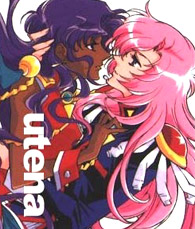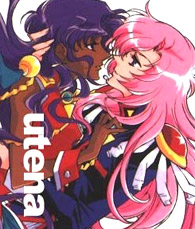There's a new pin-up girl on the lesbian film festival circuit and her name is Utena.

Anthy, the quintessential femme and the tomboyish Utena (right)
Based on a popular Japanese television series, RGU is a labor of love from award winning director Kunihiko Ikuhara and popular female comic artist Chiho Saito. With its beautiful animation, dreamlike imagery and surreal score, RGU is a mind-warping and gender-bending treat that questions and subverts traditional gender roles for adolescent girls.
The action in RGU takes place at the Ohtori Academy, a sprawling baroque private school, run by a mysterious organization referred to as the Ends of the World. This organization is in turn controlled by the Student Council, an elite group of the academy's best students and leaders. The members of the Student Council carry out duels in a secret fighting ground, the Rose Arena, in the hopes of winning the Rose Bride Anthy and obtaining the "power to revolutionize the world".
As a new transfer, the tomboyish Utena, disappointed by the failures of her own "prince" (read: boyfriend), decided that she wants to become a prince herself and so duels for Anthy not because she wants the revolutionary power but because she is angry about the way the other duelists treat Anthy when they won her hand. Dressed in boys' attire, Utena is the typical butch lesbian who wears her hair cropped short, speaks with a distinctly boyish manner and uses the masculine pronoun boku when referring to herself.
On the other hand, Anthy is the quintessential femme whose duty is to look drop-dead gorgeous, tend to the campus rose-garden and serve the needs (sexual or otherwise) of whoever wins her hand through the duels. The sister of the academy's acting chairman (and heartthrob), Akio Ohtori, Anthy finds herself drawn to Utena because of the latter's nobility and sincerity.
As the dreamlike events unfold, both Utena and Anthy develop feelings for each other and come to the realization that they will never escape the bonds of their pasts and the demands of their gender unless they escape the academy's oppressive atmosphere. The plot comes together in a thrilling 15-minute climax where Utena turns into a car that Anthy drives through many obstacles to eventually reach the outside world.

Anthy, the quintessential femme and the tomboyish Utena (right)
RGU thus signals a breakthrough in anime where female characters reject their male loves and instead turn to each other. According to the Shoujo Kakumei Utena Home Page, the movie serves as a mirror for Japanese society by reflecting the dissatisfaction Japanese girls and women have with their subordinate position in contemporary Japanese society.
Self-consciously produced from within a discourse that is concerned with feminine desires and female resistance to their social positioning, Utena's revolution takes on symbolic meaning as it addresses wider issues such as the feminist uprisings of the 1970s and the legitimization of same-sex love between women.
By putting forth the romantic notion of revolution as being capable of fundamentally changing the world through the erasure of gender and sexual categories, RGU offers lesbian love as an escape from dependence on men and by association on the society that privileges men. And because of this, Revolutionary Girl Utena truly lives up to the claim of its title.











 打印版本
打印版本










读者回应
抢先发表第一个回应吧!
请先登入再使用此功能。